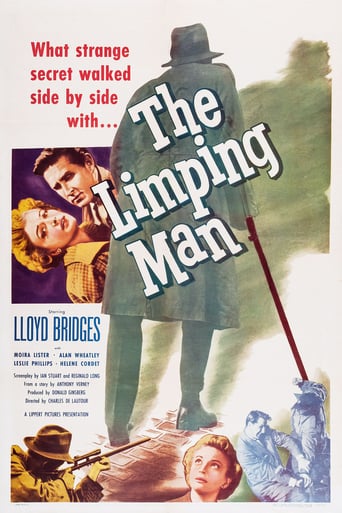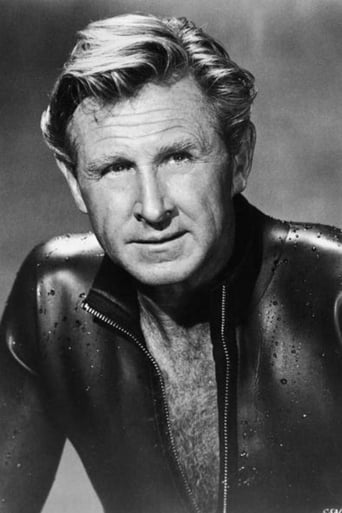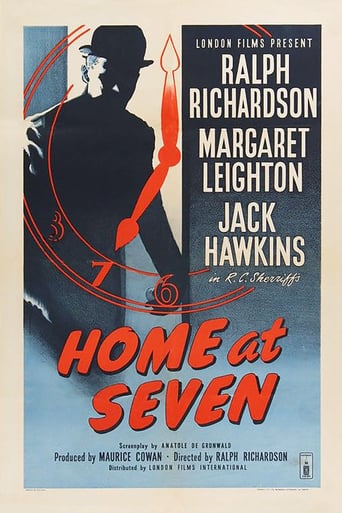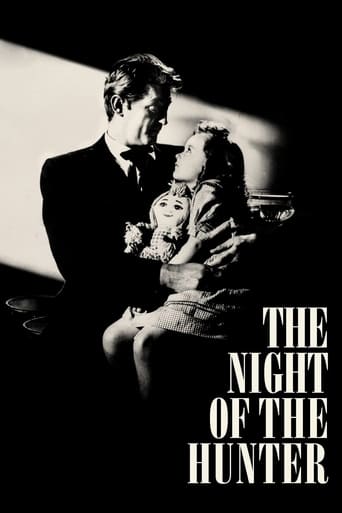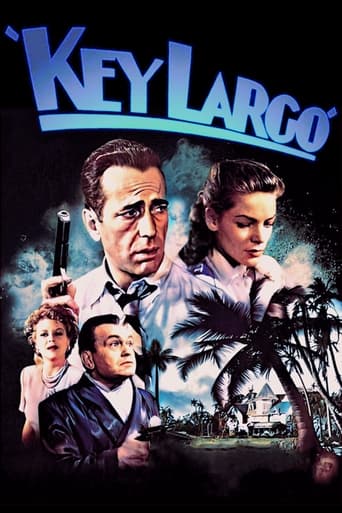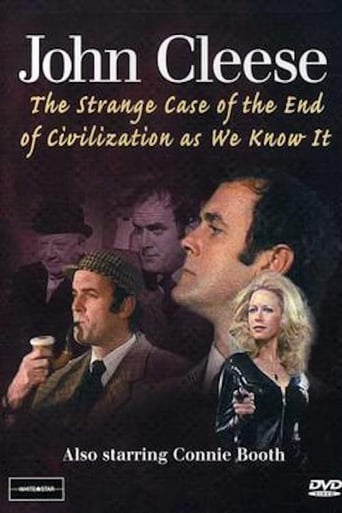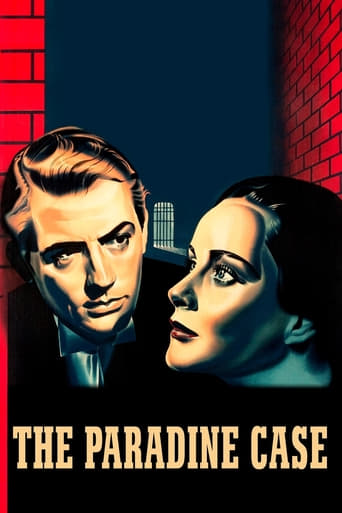The Limping Man (1953)
An American veteran returns to England after WWII to learn that his London lover has become involved with a dangerous spy ring and their search for a limping sniper.
Watch Trailer
Cast


Similar titles
Reviews
The Age of Commercialism
Purely Joyful Movie!
I cannot think of one single thing that I would change about this film. The acting is incomparable, the directing deft, and the writing poignantly brilliant.
All of these films share one commonality, that being a kind of emotional center that humanizes a cast of monsters.
I'm surprised that so many people seem to be disappointed with the ending of this film. The story is typical of a 1950s British crime film with good performances by all - but this ending makes it a bit different. It has the inevitable American lead, in this case the excellent Lloyd Bridges, to make it attractive to the US. The story is seen through to the expected ending but then we find that the story was not perhaps located where we thought it was. It does not mean that the story, still a fictional one of course, becomes any less entertaining because of it. As I get older I realise that an "unconscious" mind, so to speak, is capable of great detail and can set many random and complex problems for which it then tries to find solutions, it must then try to resolve at least some of them before it returns to full consciousness. The clues are there, remember the limping man being followed to the riverside, where did he go? Yes, the shock of the ending is sudden, but when you wake up it's usually like that, all may be forgotten in a flash. Did the writer of the original story or the director think of it like that, or was it just an attempt to be different, a joke, just for the sake of it? I don't know but I liked it.
Whoever is responsible for the story that told by this film simply didn't know of a reasonable way to pull it together, and so just let it fall apart.After an unexplained separation of six years, an American flies to the UK to meet the woman whom he loves, an actress of some fame. As he and the other passengers walk from the plane to a terminal building, a man whom he stops by chance is felled by a sniper's bullet. The sniper walked with the assistance of a crutch. It is discovered that the woman whom the American has come to see had been both sexually involved and engaged in smuggling with the man identified as the victim of the sniper; apparently she was motivated to do these things because of her longing for the American. Further, her lover had subsequently blackmailed her, and now his presumptive widow, a singer, was blackmailing her. On the way, we discover that someone with an administrative rôle at the singer's theater uses a crutch. When the actress attempts to pay the singer, the actress and the audience learn that the presumptive dead man is still alive, and being assisted by his wife. The fellow with the crutch makes an appearance and is greatly injured by the blackmailer. The police, who have been going about the business of trying to solve the murder and trying to run the actress to ground show-up. A search for the blackmailer is begun; he has for no very good reason disguised himself as the fellow with the crutch, and when the police begin looking for a man with a crutch, it does not occur to him to chuck the thing aside; instead, he retreats to a balcony. When he is spotted, the America dashes after him, instead of allowing the surrounding police to do their job. A struggle ensues, with the American finding himself to be pushed off the balcony.Were the film to break at this point, the audience would be left with many questions. Answering even just some of them in a satisfactory manner would be quite a challenge.Well, the American awakes, because it was all a dream. That was the best answer that the writers had for us. (Formally, the ending has the disembarked American and the actress happily running each towards the other, perhaps to assure us that he hasn't dreamt exactly the future he were about to enter.) If, up to that point of awakening, the story had been, in some interesting way, dream-like, then that ending might be sensible or at least forgivable. But the story had been a haphazard construction of implausibilities, and the ending was simply a cheat.
An enjoyable piece of film. Considering where the anticipated ending was going, the twist ending was a nice piece of work. Much of the mystery is left open for discussion. Why was the kindly stage door manager the killer? Was the Ex-husband disguising himself as the stage door manager all along and if so why didn't the ex-wife see through the disguise at the pub? Are rifles disguised as walking sticks common? Maybe the stage door manager was a professional hit man and it was pure coincidence that the victim knew the ex-husband? Perhaps there were two limping men, the stage door manager and the professional hit man. So the story has some holes in it, it was fun to watch and make fun of while watching.
This turkey is reasonably well roasted, and even features some side dishes that are interesting to learn more about. The ending of The Limping Man, however, is so arbitrary and dishonest it makes clear how little regard for the audience, or for the integrity of their own movie, the producers must have had. World War II vet Frank Prior (Lloyd Bridges) returns to London from America after six years to look up an old flame, Pauline French (Moira Lister), now a successful actress. As he and the other passengers deplane and walk across to the terminal, Frank pauses for a moment and asks the man beside him for a light. There's a gunshot and the man crumples to the ground, shot by a marksman with a high-powered rifle, an assassin with a limp. The dead man was named Kendall Brown. With Inspector Braddock (Alan Wheatley) and Detective Cameron (Leslie Phillips) on the case, it's clear that Prior is as mystified as everyone else. After Prior leaves the police to find Pauline, Wheatley and Cameron visit Brown's lodgings...and find a photo of a good-looking young woman. Yes, the photo is of Pauline French. It's not long before Frank Prior is up to his neck in murderous intrigue. The mix includes blackmail, smuggling, magic acts, gritty Thames-side docks, backstage theater doings, a pouting French singer and, Frank discovers, some indiscretions in Pauline's past. The plot, under Cy Endfield's direction, keeps moving briskly ahead. The photography is nifty, with lots of nighttime eeriness, shadowy theater cellars and fear-filled eyes highlighted in the gloom. But the movie reeks of class-conscious accents and acting. Whole generations of British actors, if they were to have a hope of succeeding as lead players, had to master that plummy, nasal, upper-class diction that was supposed to be the hallmark of an English gentleman or lady. When sound came to the movies, that social stratification based on how one spoke was enforced with a vengeance. Things began to change for lead players only when Michael Caine hit the big-time in Britain and kept his Cockney accent. So here's Leslie Phillips, who grew to be a fine farceur, slim, young and in a supporting role as Cameron. He was raised in poverty with a Cockney accent. His mother was determined that he'd have a chance at a better life so she saw that he had elocution lessons. Phillips wound up with one of the ripest upper-class accents you can imagine, and in a long career he has used it to great, leering effect. His Cameron is very keen on the female figure, a characteristic Phillips, now in his eighties and still acting, has in real life. Phillips is a character and great fun to watch. One of his best roles is as Lord Flamborough in 1994's Love on a Branch Line. It's one of those British television productions that you'll either be delighted by or puzzled with. Moira Lister's Pauline French (Lister was born and raised in South Africa) sounds like the carefully educated daughter of the English landed aristocracy, the kind of woman who schedules her love life with her husband as meticulously as she schedules her social engagements with her equals, and with considerably less frequency. Lister was a successful actress on the stage as well as in the movies. She sounds a little like Joan Greenwood. She gives such an overly bred, mannered performance it seems unlikely she'd ever be attracted to an American ex-GI like Lloyd Bridge's Frank Prior. However, one of the pleasures of the movie is that Frank flies into London on a Lockheed Constellation. We see several shots of this most graceful of airplanes flying and on the ground. The ending of The Limping Man is a complete cheat. While some of us might enjoy at least some of this movie's 76 minutes, and I'm one of them, its conclusion left me feeling that I'd just been made a fool of. Cy Endfield, who directed the movie, did so under the name of Charles De la Tour, a man he paid to front for him. Endfield was blackballed in Hollywood during the witch-hunts. He could no longer get directing jobs so he left for Britain with his family. The only way his early British movies could be released in America was by hiding his name. He stayed in Britain and went on to direct using his real name Zulu, Mysterious Island, Sands of the Kalahari and others.

